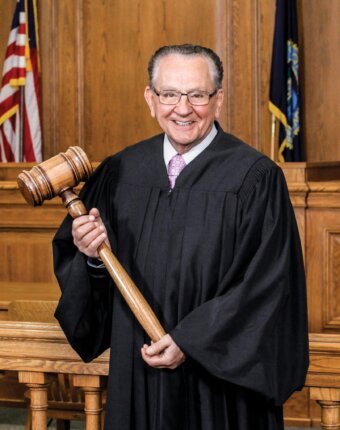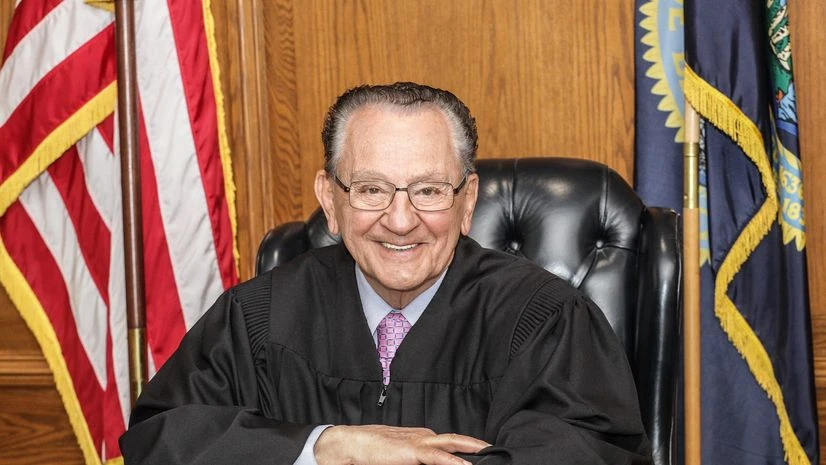Early Life and Family Background
Francesco “Frank” Caprio was born on November 24, 1936, in Providence, Rhode Island, into a humble yet loving Italian-American household. He was the second of three sons of Antonio Caprio, an Italian immigrant who worked tirelessly as a fruit peddler, milkman, and later a laborer to provide for his family, and Filomena Caprio, a homemaker whose nurturing spirit and charitable acts shaped Frank’s early sense of compassion.
The Caprio family lived in the Federal Hill neighborhood of Providence, a working-class enclave known for its Italian immigrant community. Life was far from easy—this was the post-Great Depression era, and resources were scarce. Yet Frank grew up surrounded by strong values of family loyalty, community solidarity, and perseverance.
Even as a child, Frank was no stranger to work. He shined shoes, delivered newspapers, and took odd jobs to help supplement the family’s income. These experiences not only instilled discipline but also gave him empathy for everyday struggles, which would later become central to his identity as a judge.
Frank’s household was a mix of hardship and warmth: his father’s relentless work ethic was balanced by his mother’s acts of kindness, often offering food or support to neighbors in need. These early lessons about justice with mercy would stay with him throughout his lifetime.
Education and Early Ambitions
Caprio attended Central High School in Providence, where he demonstrated not just academic promise but also athletic ability, excelling particularly in baseball. At one point, he was talented enough to draw attention from professional scouts, but his ambitions leaned toward education and service rather than sports.
After graduating high school, he enrolled at Providence College, earning a degree in 1958. He initially chose the path of education, becoming a high school history teacher for nearly a decade. During this time, he inspired countless students with his passion for history and civic duty.
Never one to settle, Frank pursued further education, enrolling in Suffolk University Law School in Boston. He balanced full-time teaching during the day with night classes in law, eventually graduating in 1965. This dual commitment reflected his discipline, ambition, and the resilience that marked every stage of his life.
Political Career and Early Community Service
Caprio’s sense of duty extended beyond the classroom. In 1962, while still in his twenties, he was elected to the Providence City Council, where he served until 1968. His tenure was defined by his advocacy for working-class families, neighborhood improvements, and accessible public services.
Unlike many politicians of the era, Caprio was approachable and deeply connected to his community. He wasn’t focused on titles or prestige—he saw politics as an extension of his teaching, a way to educate, uplift, and serve people.
During these years, he also built a private law practice, balancing his time between politics, legal work, and raising a young family with his wife, Joyce.
Stepping Onto the Bench: Judicial Career
In 1985, Caprio’s career took its most defining turn when he was appointed as a judge of the Providence Municipal Court. His sharp mind, empathetic nature, and deep sense of fairness quickly set him apart.
By 1991, he was appointed Chief Judge, a position he held for more than three decades until his retirement in 2023. His court primarily handled traffic violations and minor infractions—but under his leadership, the Providence Municipal Court became a symbol of compassionate justice known across the globe.
“Caught in Providence” and Global Fame
What started as a small local television project, “Caught in Providence,” grew into a phenomenon. Initially aired by local stations in the late 1980s, the show filmed actual courtroom proceedings, highlighting Judge Caprio’s unique style of rulings.
Unlike traditional judges, Caprio listened deeply to every defendant, often considering their personal circumstances. He became known for dismissing fines for struggling families, encouraging young defendants with life lessons, and sometimes even paying fines out of his own pocket.
His humor, wisdom, and warmth struck a chord with viewers. Clips from the show went viral on social media in the 2010s, amassing over a billion views worldwide. One particularly famous clip featured Caprio showing compassion to a grieving mother over a parking ticket—an interaction that earned millions of views and cemented his reputation as “The Nicest Judge in the World.”
Caprio’s courtroom became more than a legal venue; it became a stage where humanity, kindness, and justice coexisted.

Personal Life and Family
Behind the robe, Caprio was a devoted family man. He married Joyce E. Caprio, his high school sweetheart, and the couple shared over 60 years of marriage together. They had five children:
-
Frank T. Caprio – former Rhode Island General Treasurer
-
David Caprio – businessman and TV host
-
Marissa Caprio Pesce – attorney
-
John Caprio – public relations professional
-
Paul Caprio – community advocate
The family remained close-knit, with many members appearing in Caprio’s public life, from legal discussions to cooking shows. He also had seven grandchildren and two great-grandchildren, with whom he shared a deep bond.
For Caprio, family was the cornerstone of happiness, and his legacy is carried on not just in law and television, but in the values he passed down to his children and grandchildren.
Philanthropy and The Filomena Fund
Caprio’s compassion extended beyond his courtroom. He established the Filomena Fund, named after his mother, after a viewer was inspired by one of his rulings and donated money to help defendants in need. Over the years, this fund has assisted countless struggling families, covering fines, providing aid, and supporting local charities.
He was also active in causes such as:
-
Rhode Island Statue of Liberty Foundation – co-chair, helping raise money for the restoration of the Statue of Liberty.
-
Crossroads Rhode Island – providing housing and support for the homeless.
-
Cancer research initiatives – particularly after his own diagnosis.
Later Years, Health, and Legacy
In December 2023, Caprio announced that he had been diagnosed with pancreatic cancer. He shared the news publicly, requesting prayers and spreading awareness about the disease. Despite his health struggles, he continued to inspire millions with his resilience, optimism, and gratitude.
On August 20, 2025, Frank Caprio passed away at the age of 88, surrounded by family. His death was widely covered by major outlets like CNN, BBC, and ABC News, with tributes pouring in from across the world.
He left behind not just a family, but a global legacy of kindness. His clips continue to circulate online, teaching new generations that justice doesn’t have to be harsh—it can be humane, understanding, and uplifting.
Quick Facts
| Category | Details |
|---|---|
| Full Name | Francesco “Frank” Caprio |
| Birth Date | November 24, 1936 |
| Death Date | August 20, 2025 |
| Birthplace | Providence, Rhode Island |
| Nationality | American (Italian descent) |
| Education | Providence College (1958), Suffolk University Law School (1965) |
| Occupation | Teacher, Lawyer, Judge, TV Personality |
| Key Role | Chief Municipal Judge of Providence (1985–2023) |
| TV Show | “Caught in Providence” |
| Net Worth | $2–5 million (judicial salary, media earnings, real estate, investments) |
| Family | Wife Joyce; 5 children; 7 grandchildren; 2 great-grandchildren |
| Honors | Rhode Island Heritage Hall of Fame inductee, Emmy recognition, Statue of Liberty Foundation co-chair |
| Nickname | “The Nicest Judge in the World” |
Final Reflection
Frank Caprio’s journey from a shoeshine boy in Providence’s Federal Hill to an internationally beloved judge is a testament to the power of empathy, resilience, and integrity. His rulings went beyond fines and tickets—they became life lessons. His legacy will endure not only through the viral clips of Caught in Providence but also through the countless lives he touched directly and indirectly.
Judge Caprio showed the world that justice with compassion is not weakness—it is humanity at its strongest.



